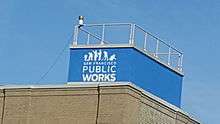San Francisco Department of Public Works

San Francisco Public Works is responsible for the care and maintenance of San Francisco’s streets and infrastructure. The department designs, builds, resurfaces and cleans streets; plants and maintains trees; designs, constructs and maintains city-owned facilities; conducts sidewalk and roadway inspections, constructs curb ramps, provides mechanical and manual street cleaning, removes graffiti from public property; and partners with the diverse neighborhoods in San Francisco. Public Works serves San Francisco residents, merchants and visitors 24 hours a day and seven days a week with a workforce of approximately 1,200 employees.[1]
History
San Francisco Public Works was officially created on January 8, 1900 with the name of Board of Public Works. Its first task was to organize and regulate street construction and paving projects throughout the city. The original four bureaus were: Streets, Lighting, Building, and Light & Water Services. Over the next century and nearly two decades later, the roles have shifted and expanded dramatically.
In 2014, after a year-long rebranding process, the department switched its name from the San Francisco Department of Public Works, or DPW, to San Francisco Public Works. The budget for the first year of operations was $637,194.00. Today, the operating budget for Fiscal Year 2015-16 is approximately $256 million.
Notable Accomplishments
1969
- The Gateway Arch to Chinatown, San Francisco was completed in September at a project cost of $76,790.
- DPW Annual Report dubbed the increase in litter as “a modern phenomenon”, blaming it on “unsolicited advertising leaflets, handbills and so-called newspapers for which no charge is made…paper and plastic in the form of product containers or wrappings.”
1974
- DPW implemented the Controlled Parking Program, which enacted scheduled parking prohibitions on streets during certain hours to clear the way for mechanical street sweepers. It began as a pilot program in the Richmond District. The Board of Supervisors approved $56,700 for 2,200 signs to be posted throughout the neighborhoods. The program eventually expanded to a new district each year after.
1976
- San Francisco General Hospital Medical Center opens. This $30 million construction project was awarded in 1971. After many construction difficulties the medical facility eventually opens.
1980
- Bureau of Engineering completes a $726,382 contract to develop and rehabilitate the music concourse in Golden Gate Park.

- Clean Water Program begins. The CPW was responsible for the design and construction of the largest capital improvement program ever undertaken at the time, which was to bring the City's sewerage system into compliance with State and Federal water pollution control laws, such as the Clean Water Act. The estimated costs at the time were $800 million by 1985.
1988
- Voters pass $27 million Street Improvement Bond Issue to improve streets, sidewalks, and traffic signals.
1989
- Within 72 hours of the October 17th San Francisco earthquake, DPW performed 1,600 building inspections. In all that year, over 15,000 inspections were made, classifying buildings Red (unsafe), Yellow (limited entry), and Green (safe).
1994
- The graffiti abatement program begins with two painters from the Bureau of Building repair and ten young people form the Mayor's Youth Worker Program.
1997
- $70.5 million Civic Center Courthouse for the San Francisco Superior and Municipal Civil Courts is completed.
1998
- The $56 million War Memorial Opera House Seismic Upgrade and Improvement Project construction was completed.
References
- ↑ SFDPW 2008-2009 Strategic Plan, City of San Francisco